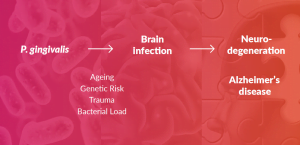There are many different factors involved in whether you will get Alzheimer’s or not. These include age, family history and genetics- all factors we have no control over. Based on new scientific discoveries, Glasgow Memory Clinic are currently looking for people to take part in our new study, The GAIN trial.
This trial is based on a growing body of scientific evidence that the (P. gingivalis bacteria) most commonly associated with gum disease, can infect the brain and cause Alzheimer’s disease. The study is evaluating whether COR388, an oral investigational medicine, can slow or halt the progression of Alzheimer’s disease.

To qualify for this study, you must:
- Be 55-80 years old
- Have been diagnosed with mild-to-moderate Alzheimer’s disease
- Have a caregiver or family member who can attend study visits with you, report on daily activities and oversee you taking medication
People who qualify for this research study may receive:
- Investigational drug
- Top class study-related care from doctors at Glasgow Memory Clinic
- Reimbursement for all travel expenses
- Tea, coffee and lunch facilities during their visits to the clinic
If you or a loved one with Alzheimer’s disease are interested in volunteering, you will need to complete our short pre-screener form.
At Glasgow Memory Clinic, we are proud to have been selected as a research site participating in this large international clinical trial to test a dramatically new way of understanding and treating Alzheimer’s disease. For decades, much of the Alzheimer’s clinical research has focused on other approaches with little success. In the GAIN Trial, we are evaluating a completely different mechanism of Alzheimer’s. We are testing the hypothesis that bacteria can cause Alzheimer’s, and that inactivating the toxic proteins released by the bacteria can have a positive impact on stopping or slowing the progression of this devastating disease.
The study drug, COR388, was designed by pharmaceutical company Cortexyme to inactivate the toxic gingipains created by the P. gingivalis bacteria, reduce inflammation, reduce the bacterial infection and slow or halt progression of Alzheimer’s disease. An earlier small clinical study showed COR388 was well-tolerated, with a promising trend of average improvement in the memory test performance for the Alzheimer’s patients in the study who took the drug compared to placebo.
Why is clinical research into Alzheimer’s disease so important?
Most of us have in some way benefited from medical research without necessarily realising it. Medication that is available to us all today wouldn’t exist if it were not for people taking part in medical research to test if treatments are effective. Some volunteers are interested in access to investigational drugs or treatments which aren’t available on the NHS, while others volunteer to help advance science and our knowledge on Alzheimer’s.
Whatever your reason for participating, you are contributing to helping us find a cure for Alzheimer’s disease!
For additional information on this study, download the GAIN Study Brochure
To take part in this study, fill out our short pre-screener form.